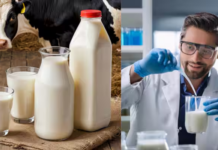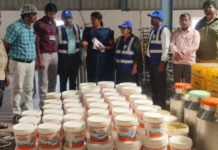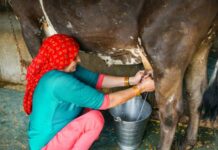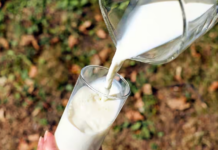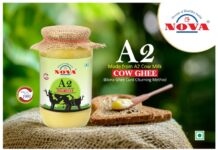New Delhi, September 17, 2024: Optimistic signals from the fast-moving consumer goods (FMCG) sector in the second quarter of 2024 have raised expectations for a stronger recovery in the dairy industry before 2025.
Tran Huong My, head of Consumer Goods Research at Ho Chi Minh Securities Corporation (HSC), noted that the FMCG sector grew by 2.2 per cent in the second quarter, a surprising bright spot after a period of negative growth since the third quarter of last year and stagnation in the first quarter of this year.
The dairy industry, in particular, saw a recovery, improving from minus 4 per cent in the fourth quarter of 2023 to minus 1 per cent in the second quarter of 2024, indicating a resurgence in consumer demand.
“The growth momentum in the consumer goods sector is expected to continue in the third quarter of 2024, with revenue projected to rise by 12 per cent and profit by 53 per cent,” My said.
According to HSC, 10 listed companies in the consumer goods sector, including Vinamilk, Masan, Mobile World, and Saigon Beer-
Alcohol-Beverage Corporation, recorded a 13 per cent increase in total revenue and a 55 per cent rise in profit, which exceeded forecasts by 7 per cent.
Nguyen Quang Tri, marketing operations director of Vinamilk, noted that products such as sweetened condensed milk, drinking yogurt, and eating yogurt have shown solid growth in the dairy sector. “If powdered infant milk and liquid milk also recover soon, the dairy industry will return to its growth trajectory of previous years,” Tri said.
Vinamilk has reported favourable business results in the first half of this year, attributed to its brand repositioning strategy and strong performance in milk exports.
In Q2, Vinamilk’s milk export revenue reached $72.5 million, a 37 per cent increase on-year, while overseas branches posted gross revenue of $57.6 million, a 21.8 per cent rise compared to the same period last year.
Tri said that Vinamilk would continue to reposition its remaining product lines, particularly powdered infant milk, which is seen as a platform for initial consumer engagement and building stronger connections with the brand.
“This involves more than just a packaging change. It represents a comprehensive transformation in product quality, features, and benefits for consumers,” he said.
Brand health measurement results from IPSOS indicate that Vinamilk’s innovation index rose from 76 per cent in 2023 to 82 per cent in the first half of 2024. The brand’s value has also increased from $2.8 billion in 2022 to $3.3 billion in 2023, with its domestic market share in the dairy industry growing by 1.4 percentage points between March and the end of July 2024.
Meanwhile, Morinaga Nutritional Foods Vietnam, a subsidiary of Japan’s Morinaga Milk Industry Group, continues to innovate and offer advanced nutritional solutions to customers through its flagship products such as non-fat yogurt and nutritional drinks.
“We are increasing our focus on marketing and communication strategies to raise awareness of our brands and products across Vietnam,” said Matsumoto Yoshinobu, marketing director of Morinaga Vietnam.
Morinaga entered the Vietnamese market in 2021 after merging with long-established domestic company Elovi Vietnam. In April, the company rebranded as Morinaga Nutritional Foods Vietnam.
Despite success in Japan, Morinaga has not yet gained significant traction in Vietnam, partly due to strong competition from domestic and imported brands. “Leading brands have built long-term trust among consumers and benefit from strong brand recognition and distribution networks,” said Matsumoto.
The limited marketing activities, and the relatively short time since entering the market have also posed challenges. However, Matsumoto remained optimistic. “We are still making efforts to affirm brand value and product quality to our partners and consumers. We have also received high appreciation from our partners and consumers in developing a greater presence in large retail chains, improving product quality and flavour,” he added.
In 2023, Vietnam’s dairy market revenue was estimated at $5.2 billion, driven mainly by powdered and liquid milk products, according to the Vietnam Dairy Association (VDA). Fresh milk production reached 1.86 billion litres, while powdered milk production totalled 154,800 tonnes according to the reports published in vir.com.vn.
However, Vietnam’s per capita milk consumption remains relatively low, ranging from 26 to 28 litres per person per year, compared to 35 litres in Thailand, 45 litres in Singapore, and 80-100 litres in European countries, as reported by the VDA.
Research and Markets forecast that per capita milk consumption in Vietnam will reach 40 litres per year by 2030, with a compound annual growth rate of about 4 per cent. This suggests significant growth potential for Vietnam’s dairy market.
Nonetheless, competition in the dairy industry remains a challenge for new entrants. Most raw materials for Vietnam’s dairy production are still imported due to the country’s unfavourable conditions for dairy farming. The number of large domestic dairy producers is also limited.
Currently, Vietnam has over 230 dairy producers, but the market is dominated by major corporations such as Vinamilk, which holds about half of the market share, FrieslandCampina Vietnam with 25 per cent, TH Group with 7 per cent, and Nestlé Vietnam with 7 per cent.
According to the Food and Agriculture Organization of the United Nations, global milk production is expected to reach over a trillion tonnes by 2032, with an annual growth rate of 1.5 per cent from 2024 to 2032, surpassing other agricultural commodities.



